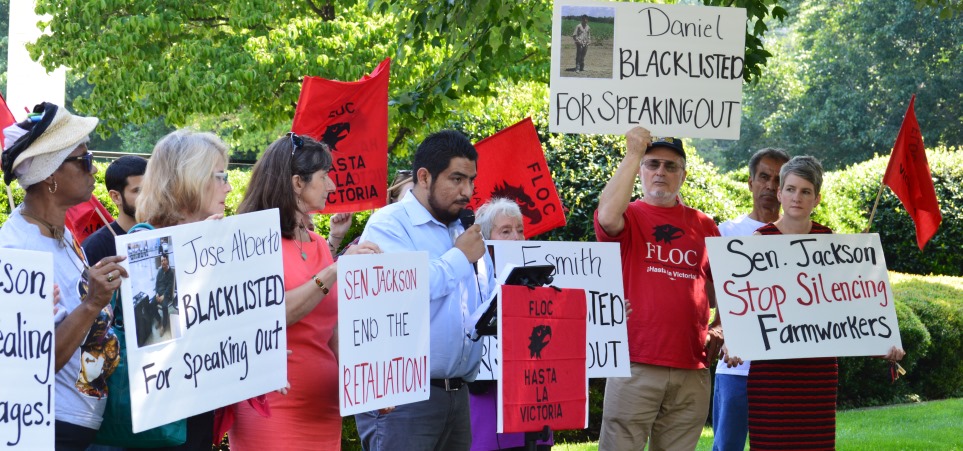By Raul Jimenez, FLOC Organizer
June 20, 2016
A few weeks ago, I was part of a group of faith leaders, labor leaders, and community allies who delivered the names of 10,000 petitioners to Senator Brent Jackson, calling on him to reinstate seven farmworkers who were blacklisted from working on his farm in Autryville, NC, after they spoke out about wage theft and unjust firing.
A News and Observer article reported that Sen. Jackson’s attorney denies any wrongdoing and says that two of the seven workers are already working on other farms in North Carolina, proving that they had not been blacklisted. The truth is that only one worker has been able to find other work, and that certainly does not mean there was no retaliation. If a worker was fired from an office job for speaking out, would we ever say that there was no retaliation because they were able to find a job in another office?
I worked in the fields as a teenager, and while I didn’t experience it myself, threats and retaliation were not uncommon on other farms. It’s not a coincidence that none of the workers involved in the suit were brought back to work on Jackson’s farm this season. Managers from Sen. Jackson’s farm even called several of the workers after they sued and threatened that, if they didn’t drop the lawsuit, they wouldn’t be brought back to work on the farm. For H2A visa workers who rely on the employer’s request to guarantee employment, this is a serious threat.
When a workplace is run with threats and fear, immigrant workers, who have no protection when they complain, often face a choice – either put up with abusive working conditions or speak up and risk losing their livelihood.
This is not the first time workers on Sen. Jackson’s farm have come forward with wage issues.
In 2014, a group of workers filed a grievance under the FLOC union contract, which covered Jackson Farms at the time. The workers all documented the same type of wage theft that the seven workers in last year’s law suit experienced – clocking workers out for water breaks, during transportation between fields, and any other small break throughout the day. Jackson Farms ended up having to pay thousands of dollars in back wages to settle the grievance with the workers in 2014 and obviously has made no attempt to correct the illegal wage practices since then.
Sen. Jackson’s attorney may continue to deny the allegations, but with the history of wage problems on his farm, threats from his farm employees, and seven workers now forced to find other work, it’s clear the workers were right to come forward about these problems even though they are now face retaliation for that choice.
You can still speak out against this retaliation. Click here to send an email to Jackson Farms and the tobacco companies, urging them to stop the retaliation, rehire the seven farmworkers, and pay them the wages they are owed.
